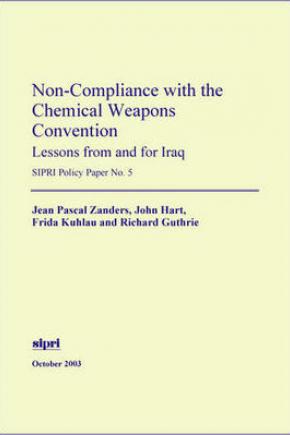Non-compliance with the Chemical Weapons Convention: Lessons from and for Iraq
While world attention currently focuses on the evidence of Iraq's actual chemical weapon capacity or its absence, a more serious question for the long term is how the country can be made and kept free from all weapons of mass destruction (and related technologies). Any reliable solution will need to draw on the experiences of the United Nations Monitoring, Verification and Inspection Commission and its predecessor, the United Nations Special Commission on Iraq, as well as on general considerations about the value of multilateral arms control and disarmament agreements for resolving such questions. The aim of this study is to promote an understanding of how such agreements, notably the 1993 Chemical Weapons Convention, are and could be applied at the operational level, while drawing attention to other practical and political factors relevant to handling the Iraqi case. While much of the information and analysis offered might help in addressing other cases of concern as well, it should be stressed that the challenge of Iraq has taken on many unique features in recent years.
Click here to download Policy Paper No. 5
About the authors
Richard Guthrie (United Kingdom) became the Leader of the SIPRI Chemical and Biological Warfare Project and editor of the SIPRI Chemical & Biological Warfare Studies series in September 2003. Prior to that he was an independent consultant dealing with defence and security issues with a specialization in the control of WMD and was involved in a long-term collaboration with the Harvard Sussex Program, where he was responsible for production of The CBW Conventions Bulletin and for managing certain data resources. He also edited/co-edited seven volumes of the VERTIC yearbook in 1991-97; the VERTIC newsletter Trust and Verify in 1992-97; and produced the PPNN Newsbrief in 1989-2001.
John Hart (United States) has been a Researcher on the SIPRI Chemical and Biological Warfare (CBW) Project since 2001. Previously, he worked as an On-Site Inspection Researcher at the London-based Verification Research, Training and Information Centre (VERTIC) and as a Research Associate at the Monterey Institute of International Studies (MIIS) Center for Nonproliferation Studies. In 1996-97 he worked as a Research Assistant on the SIPRI CBW Project. He is co-author of the SIPRI Fact Sheets 'The Chemical Weapons Convention' (1997) and 'Biotechnology and the Future of the Biological and Toxin Weapons Convention' (2001). He co-edited Chemical Weapon Destruction in Russia: Political, Legal and Technical Aspects, SIPRI Chemical & Biological Warfare Studies no. 17 (1998) and contributed to the SIPRI Yearbook in 1997, 1998, 2002 and 2003.
Frida Kuhlau (Sweden) joined the SIPRI Chemical and Biological Warfare Project in 2001. She is co-author (with John Hart and Jean Pascal Zanders) of the SIPRI Fact Sheets 'Biotechnology and the Future of the Biological and Toxin Weapons Convention' (2001) and 'Maintaining the Effectiveness of the Chemical Weapons Convention' (2002). She contributed to the SIPRI Yearbook in 2002 and 2003.
Dr Jean Pascal Zanders (Belgium) is the Director of the Geneva-based BioWeapons Prevention Project. He was the Leader of the SIPRI Chemical and Biological Warfare Project and editor of the SIPRI Chemical & Biological Warfare Studies series in 1996-2003. He has published extensively on CBW issues in English, Dutch and French since 1986 and edited Chemical Weapons Proliferation (1991, with Eric Remacle) and The 2nd Gulf War and the CBW Threat (1995). He has contributed to the SIPRI Yearbook since 1997 and to the SIPRI volume The Challenge of Old Chemical Munitions and Toxic Armament Wastes (1997). He is co-author of a number of SIPRI Fact Sheets. His most recent paper is 'Challenges to disarmament regimes: the case of the Biological and Toxin Weapons Convention', Global Society (2001).
1. Introduction
2. The UNSCOM and UNMOVIC mandates
3. The objectives of the CWC
4. Addressing Iraq's activities under the CWC in the light of UNSCOM and UNMOVIC experiences
5. Iraq's accession to the CWC
6. Conclusions
Appendix 1. International arms transparency measures, by country
Appendix 2. CWC timetable for certain activities and deadlines for states parties
Appendix 3. Non-compliance scenarios under the CWC
Appendix 4. The precedent of the IAEA and EURATOM and the negotiation of the Non-Proliferation Treaty


